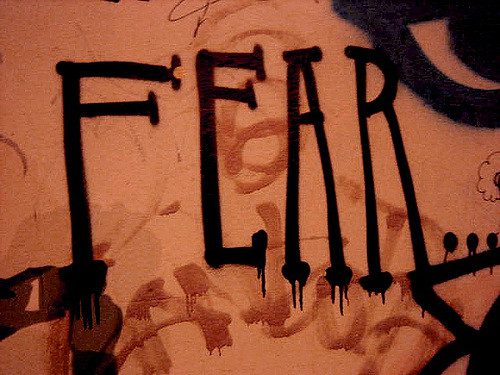
By Paul Louis Metzger and John W. Morehead: President Trump warned evangelical leaders at the White House this week that their joint work will be overturned “quickly and violently” if the GOP loses the mid-term elections. Such language likely struck fear into the hearts of many of the President’s most ardent evangelical supporters. How often is fear the dominant response of evangelicals in our culture today rather than love?
We readily acknowledge the prominent place fear occupies in our country today. On the Right, the perception is that eight years of progressive reforms under President Obama threatened the well-being of white Middle America. Whether this perception reflects reality or not, many who voted for Mr. Trump feared being left behind by the Left. But it is not just the Right where fear plays a prominent role. The feeling of fear is ubiquitous. It can be found across the political and cultural spectrum.
Frank Furedi published Culture of Fear in 1997, and revisited the topic in 2018 with How Fear Works: Culture of Fear in the 21st Century. He argues that “fear has become a powerful force that dominates the public imagination,” and that fear is used and abused by those on the Right and the Left. A summary of Furedi’s explanation for why the culture of fear has arisen can be found on the dust jacket for the book:
Furedi argues that one of the main drivers of the culture of fear is unravelling of moral authority. Fear appears to provide a provisional solution to moral uncertainty and is for that reason embraced by a variety of interests, parties and individuals. Furedi predicts that until society finds a more positive orientation toward uncertainty the politicization of fear will flourish.
Evangelicals are no strangers to fear. Jason Bivins, in his book Religion of Fear: The Politics of Horror in Conservative Evangelicalism, and in an academic article written on the topic, describes this religious subculture as a “religion of fear,” and in his view this results in “political orientations [that] are shaped and spread by pop cultural narratives of fear and horror.” He goes further and argues that evangelicalism and fear in political culture involve “representations of fear and evil [that] are not only central to conservative evangelicalism’s political self-understanding in the contemporary United States, they are also integral to the production of this religious culture’s identity, self-understandings, representations, and cultural/political ambitions more broadly.”
While fear is a natural reaction to an imminent threat, it is also a cunning tactic used by political and religious leaders of various stripes to motivate their base. Evangelicals are easily subject to manipulation, and this can play into the worst aspects of our nature, such as fear of immigrants.
Hopefully, all evangelical Christians account not simply for natural reactions but also supernatural responses, including 1st John 4’s emphasis on love: “There is no fear in love, but perfect love casts out fear. For fear has to do with punishment, and whoever fears has not been perfected in love” (1 John 4:18; ESV).
While some will consider love of any kind irrelevant and naïve in political discourse, the Bible does not make qualifications on the fruit of the Spirit’s import for the various domains of life. After all, Jesus, who gave his life for the world in sacrificial love, is Lord of all. His lordship of all-powerful love bears upon all of us, and upon every domain of life.
Over the years, we have encountered not only fellow evangelicals who have great fear of people of other religious and political convictions, but people of other religious and political convictions who have great fear of us as evangelicals. When we mention the latter response to our evangelical friends, they are often quite surprised: ‘Why would anyone fear us? We are peace-loving, moral people,’ or so we think.
Some of the fears of our fellow white evangelicals concern the increasing ethnic and religious diversification in the United States. At some point, we will become a minority population, which can easily send alarm bells ringing through white evangelicals’ imaginations. Just like other tribal groupings, including those who fear us, we white evangelicals have a natural tendency to fear the other. No matter how natural for each of us, though, will fear gain the upper hand and conquer us?
It behooves us as evangelical Christians not to allow fear to gain the upper hand in our cultural engagement today, but love, given our biblical convictions (including 1 John 4:18). Besides, if we do not learn to navigate the increased diversity in our country in a winsome, collaborative and dialogical manner, the day will come when we really will face overwhelming pushback, far beyond what we experience today. Now that really is a cause for fear! But again, fear should not prevail, but love of the other, including love of our enemies, as Christian Scripture exhorts us (Matthew 5:43-48). This is by no means easy for anyone of us, but we claim to follow an all-powerful, loving God, who will fill us with the Spirit of Jesus. Let’s rely on God’s comforting presence and empowerment! May the world all around us see how great God’s love for them is as manifest in our lives, and may such love extinguish our fear.
John W. Morehead is the Director of the Evangelical Chapter of the Foundation for Religious Diplomacy, and project leader of the Multifaith Matters Collaborative Inquiry Team. Paul Louis Metzger serves with him at FRD as Senior Research Fellow and a Charter Member of its Evangelical Chapter, as well as at Multifaith Matters.












